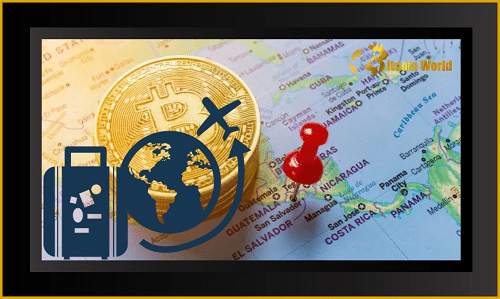Imagine a country where your Bitcoin can buy you a pupusa and a surfboard rental. That’s the reality in El Salvador, and according to President Nayib Bukele, this embrace of cryptocurrency is a major driver behind the nation’s soaring tourism numbers. Intrigued? Let’s dive into how Bitcoin, alongside other factors, is reshaping El Salvador’s image and economy.
Bitcoin and the Tourism Boom: Is There a Connection?
President Bukele has been vocal about the positive impact of making Bitcoin legal tender in El Salvador. He boldly stated that the recent surge in tourism can be directly attributed to this decision, alongside the country’s growing reputation for surfing and its successful efforts in reducing crime. Think about it: a nation making headlines for its innovative approach to finance and its stunning natural beauty? It’s a compelling combination.
“Only a handful of countries have been able to recover their tourism to pre-pandemic levels. And that’s international tourism, so the reasons behind it are mostly bitcoin and surf,” Bukele shared on Twitter. He further highlighted the growth in domestic tourism, crediting the government’s crackdown on gangs for creating a safer environment for locals to explore their own country.
The numbers seem to back up these claims. The World Tourism Organization reports that El Salvador’s tourism revenue has increased by an impressive 6% compared to pre-pandemic levels in 2019. That’s a significant achievement, especially considering the global challenges the tourism industry has faced in recent years.
Even before these latest figures, the Minister of Tourism, Morena Valdez, pointed to a 30% spike in the tourism industry since Bitcoin was adopted as legal tender in September 2021. She emphasized that El Salvador is transforming into a desirable destination for visitors, investors, and those seeking a new place to call home.
Here’s a breakdown of the financial impact:
- Increased Tourist Spending: Tourists interested in utilizing Bitcoin tend to stay longer and spend more.
- Higher Daily Expenditure: Pre-Bitcoin, daily spending ranged from $113 to $150. Now, it’s up to $200 per day.
How Does Crime Reduction Factor In?
Beyond Bitcoin, the significant reduction in crime is another crucial piece of El Salvador’s tourism success story. President Bukele’s administration has taken a firm stance against gang-related crime, leading to the detention of thousands. While these measures have faced criticism, Bukele argues they are essential for creating a safe and attractive environment for both domestic and international tourists.
To illustrate the increased mobility and sense of security, Bukele shared a link to the Google Mobility Report. This data reveals a rise in visits to various locations, including parks, grocery stores, and pharmacies, indicating a greater sense of freedom and safety among the population.
Looking Ahead: More Bitcoin on the Horizon?
El Salvador’s government appears optimistic about the future of Bitcoin adoption and its continued positive impact. A recent announcement from Bank Of The Future, a cryptocurrency investment platform, indicates a potential $6 billion investment in the country. This news, shared by El Salvador’s ambassador to the US, Milena Mayorga, suggests a growing confidence in the nation’s crypto-friendly policies.
Will Other Countries Follow El Salvador’s Lead?
El Salvador isn’t alone in exploring the potential of cryptocurrencies. The Central African Republic made headlines as the second nation to adopt Bitcoin as legal tender. This raises the question: are we on the cusp of a global trend? Could more countries see the benefits of embracing digital currencies, not just for their economies but also for sectors like tourism?
While it’s still early days, El Salvador’s experience offers a fascinating case study. The combination of innovative financial policies, a focus on safety, and natural attractions seems to be a winning formula. Whether other nations will replicate this success remains to be seen, but El Salvador’s journey is certainly one to watch.
Key Takeaways:
- Bitcoin as a Tourism Catalyst: President Bukele directly links the adoption of Bitcoin to the significant increase in tourism.
- Statistical Backing: Reports from the World Tourism Organization and the Ministry of Tourism support the claim of tourism growth.
- Increased Spending: Tourists using Bitcoin tend to spend more per day.
- Safety and Security: Crackdown on gangs has contributed to a rise in both domestic and international tourism.
- Global Trend?: Other countries, like the Central African Republic, are also exploring Bitcoin adoption.
El Salvador’s experiment with Bitcoin is more than just a financial decision; it’s a bold move that appears to be reshaping its tourism industry and its global image. As more data emerges and other nations observe, the long-term impact of this pioneering approach will become clearer. For now, El Salvador stands as a unique example of how embracing digital currencies can intersect with and potentially boost traditional sectors like tourism.
Disclaimer: The information provided is not trading advice, Bitcoinworld.co.in holds no liability for any investments made based on the information provided on this page. We strongly recommend independent research and/or consultation with a qualified professional before making any investment decisions.


